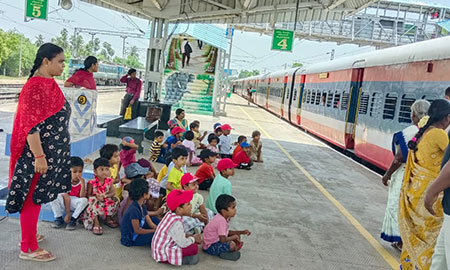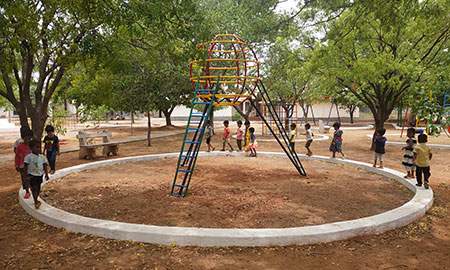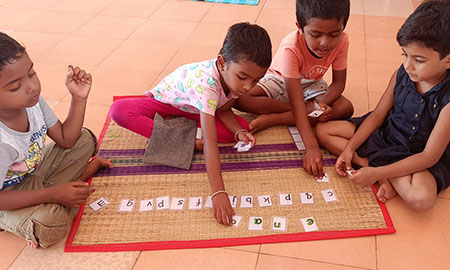Children are born with a disposition to play, to observe, to investigate, to learn and make sense of their experiences. The Kindergarten at Chettinad Vidya Mandir is a warm, caring and joyful environment that nurtures children. The open courtyard, indoor play area, the sensorial pathway, well ventilated spacious classrooms, the experience rich learning corners – pave the way for a sensorial, experiential learning journey. The kindergarten programme helps the child develop physically, socially, emotionally, cognitively and spiritually.
Our Curriculum
We follow an eclectic curriculum that is progressive, child-centric and is inspired by educational philosophies of Waldorf and Montessori.
Waldorf approach emphasizes on an ‘unhurried childhood’ and focusses on building a developmental foundation that will contribute to a happy, healthy, well-rounded and competent child. The growth is not accelerated with learning beyond the child’s age. It integrates art, music and dance in the academic disciplines. The motivation comes from within and children develop a deep love for learning.
Montessori approach views the first phase of learning as the most dynamic and of highest importance. The ‘prepared environment’ with materials and tasks helps children achieve a sense of self, self-mastery and mastery of their environment through repetition of tasks and successful execution supporting hands-on learning.
The learning spaces at Chettinad Vidya Mandir is nurturing and harmonious. The kindergarten and primary blocks are surrounded by open spaces giving children ample scope to learn through exploration and making sense of the world.
Methodology: The foundation stage focuses on the four core areas, social-emotional development, Motor skill development, Language and Numeracy. Each day begins with a circle time which encourages social interaction, listening, conversing, understanding and sharing thoughts and feelings. Classrooms are well-resourced with age-appropriate materials for the children to experience, explore and learn.
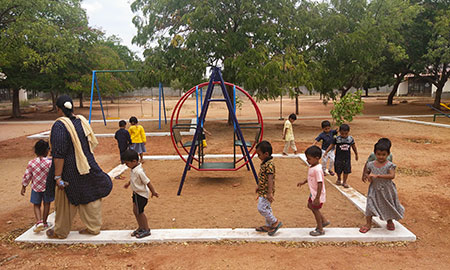
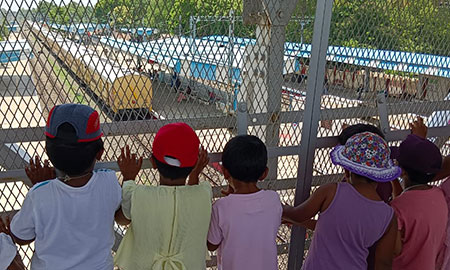
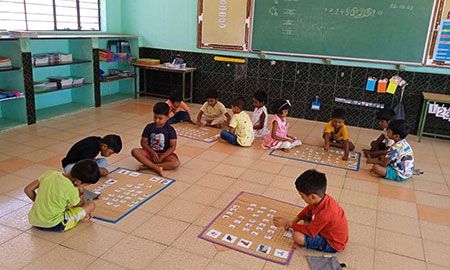
Learning Areas
Exercises of practical life
Activities like sweeping, sewing, gardening helps children learn to focus, sequence and coordinate movements. It also supports with the seamless transition from home to school. Through a simple activity like cutting a carrot, children learn sequence, concentration, hand-eye coordination leading to development of fine motor and gross motor skills. These experiences provide a strong foundation for Math, reading and writing skills as they move to grade 1.
Language: The theme-based learning, with hands-on activities provides a rich context for oral language development and writing skills. Enrichment of vocabulary and phonemic awareness happen through storytelling, rhymes, role play, picture cards, read aloud and sandpaper tracing. The reading corner in the classroom provides an opportunity to enter the world of imagination and fantasy. Children begin to speak and express themselves. Tamil is a compulsory language and taught from toddlers.
Arithmetic: Pre math skills like order, precision, sense of sequence fostered through Exercise of Practical Life (EPL) and sensorial activities lay the foundation for mathematics. The basic numeracy skills are important for children in pre-primary. It provides vital life skills. Matching, sorting, pairing, comparing and ordering skills are introduced to the children in the toddlers. The quantification of numbers, basic addition and subtraction are taught through age-appropriate activities, concrete materials and manipulatives.
Sensorial: Sensorial material are presented through a series of sequenced activities which help refine and sharpen the senses and create a sensory foundation for further intellectual development. Material appealing to visual (seeing), tactile (touch), auditory (listening), gustatory (tasting), olfactory (smelling) senses are presented, one at time. Each of them proceeds from simple to complex, supporting the transition from concrete to abstract required in later years of learning.
House Visits: House visits establish a sense of community and camaraderie among children and parents. Each child in the class invites the whole class to his/her home. Children of the class along with their class teacher visit the house of the classmates. This contributes immensely towards building social competence of the children.
